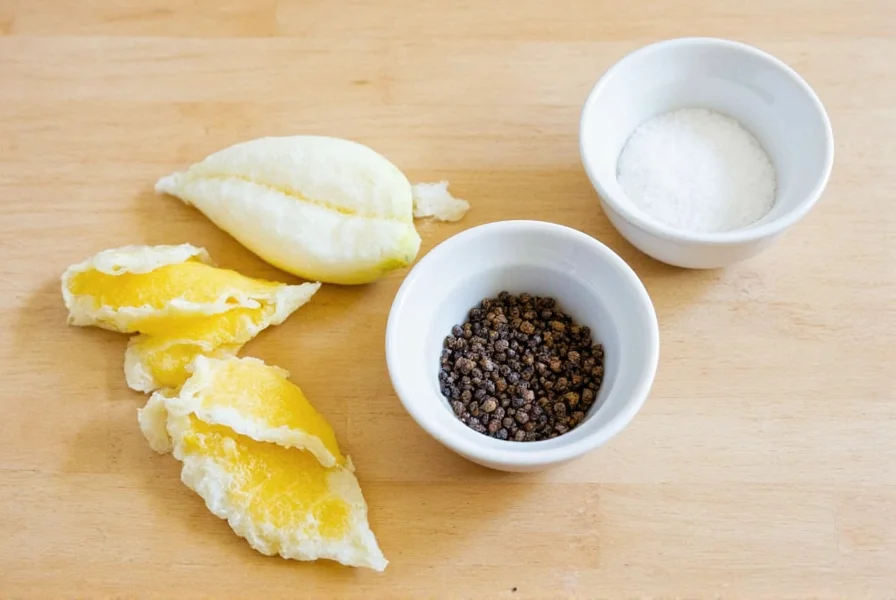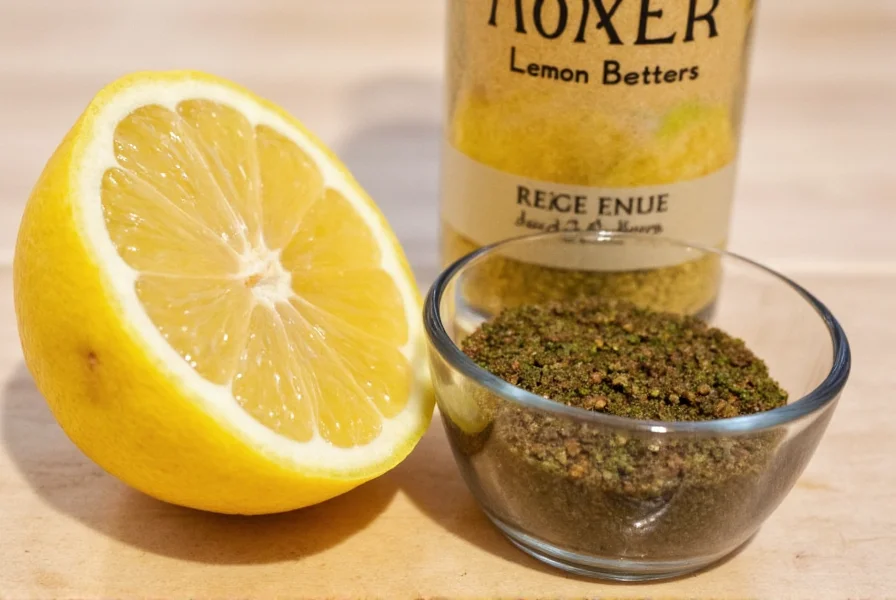When you're out of lemon pepper seasoning but need that bright citrus and peppery kick for your dish, knowing effective substitutes can save your recipe. Lemon pepper is a versatile seasoning blend typically containing lemon zest, black pepper, salt, and sometimes additional herbs like parsley or garlic powder. Whether you've run out of the store-bought version or need a customized alternative for dietary reasons, these practical swaps deliver similar flavor profiles with ingredients you likely have in your pantry.
Understanding Lemon Pepper and Why Substitutes Are Needed
Lemon pepper seasoning combines the bright acidity of lemon with the sharp heat of black pepper, creating a balanced flavor that enhances fish, chicken, vegetables, and salads. Commercial blends often include salt as a primary ingredient, which can be problematic for those monitoring sodium intake. Other reasons you might need a substitute include:
- Running out of pre-made lemon pepper
- Wanting to control sodium content
- Needing gluten-free or preservative-free options
- Desiring fresher, more vibrant flavor
- Accommodating specific dietary restrictions
Top 5 Lemon Pepper Substitutes
1. Fresh Lemon Zest and Cracked Black Pepper
This is the purest substitute that captures lemon pepper's essence without additives. The natural oils in fresh lemon zest provide superior citrus flavor compared to dried alternatives.
Recipe: Combine 1 teaspoon fresh lemon zest with ½ teaspoon freshly cracked black pepper and ¼ teaspoon salt. Adjust ratios based on your taste preferences and recipe requirements.
Best for: Finishing dishes, salad dressings, and delicate proteins like fish where fresh flavor shines. The zest provides intense citrus aroma without the moisture of juice.
2. Lime Zest with Black Pepper
When lemons aren't available, lime offers a similar citrus profile with a slightly different flavor note that works well in many applications.
Recipe: Use 1 teaspoon fresh lime zest with ½ teaspoon black pepper and ¼ teaspoon salt. Add a pinch of garlic powder for complexity if desired.
Best for: Mexican, Asian, and Caribbean dishes where lime traditionally complements the cuisine. Works particularly well with grilled shrimp and chicken tacos.
3. Lemon Juice, Pepper, and Garlic Powder Blend
This liquid-based substitute works well when you need to incorporate the seasoning into sauces, marinades, or dressings.
Recipe: Mix 2 tablespoons fresh lemon juice, ½ teaspoon black pepper, ¼ teaspoon garlic powder, and ¼ teaspoon salt. Whisk thoroughly before adding to your dish.
Best for: marinades, salad dressings, and sauces where liquid ingredients are appropriate. The garlic powder adds depth that mimics some commercial blends.
4. Orange Zest with Black Pepper
For a slightly sweeter citrus alternative, orange zest provides a milder citrus note that works well with certain proteins and vegetables.
Recipe: Combine 1 teaspoon orange zest with ½ teaspoon black pepper and ¼ teaspoon salt. Add a pinch of dried thyme for herbal complexity.
Best for: roasted vegetables, pork dishes, and chicken preparations where a sweeter citrus note complements the main ingredient.
5. Pre-Made Citrus Pepper Blends
If you prefer a shelf-stable option, several brands offer alternative citrus pepper blends that can serve as direct substitutes.
Recommendation: Look for blends labeled "lemon herb pepper" or "citrus pepper" that contain minimal ingredients. Check labels for sodium content if that's a concern.
Best for: quick substitutions when fresh ingredients aren't available. These work well for seasoning before cooking rather than finishing dishes.
| Substitute | Flavor Intensity | Best Applications | Shelf Life |
|---|---|---|---|
| Lemon zest + pepper + salt | ★★★★★ | Finishing dishes, delicate proteins | 1-2 days refrigerated |
| Lime zest + pepper | ★★★★☆ | Mexican/Asian cuisine, grilled shrimp | 1-2 days refrigerated |
| Lemon juice + pepper + garlic | ★★★☆☆ | Marinades, dressings, sauces | 3-4 days refrigerated |
| Orange zest + pepper | ★★★☆☆ | Roasted vegetables, pork dishes | 2-3 days refrigerated |
| Pre-made citrus blends | ★★★☆☆ | General seasoning, quick fixes | 6-12 months |
Using Lemon Pepper Substitutes Effectively
Understanding when and how to apply your substitute makes all the difference in achieving the desired flavor profile. Consider these professional tips for best results:
Timing Matters
Add fresh zest-based substitutes toward the end of cooking to preserve their bright flavor. The volatile citrus oils dissipate with prolonged heat exposure. For pre-cooking seasoning, use the juice-based version or add zest early with the understanding that the citrus note will mellow.
Adjust for Salt Content
Most commercial lemon pepper contains significant salt. When using homemade substitutes without salt, you'll need to adjust your overall seasoning. Add salt separately to taste after incorporating your lemon pepper alternative.
Consider the Protein
Different proteins pair better with specific substitutes. Delicate fish works best with fresh lemon zest, while heartier meats like pork or chicken can handle the stronger notes of lime or orange zest. For salmon, try lemon zest with a touch of dill for a restaurant-quality finish.
Storage Tips for Homemade Blends
If making larger batches of zest-based substitutes, store them in airtight containers in the refrigerator. The zest will maintain optimal flavor for 1-2 days. For longer storage, freeze the zest in ice cube trays with a bit of oil, then transfer to freezer bags.
Common Mistakes to Avoid
Even with the right substitute, improper usage can compromise your dish. Watch out for these common pitfalls:
- Using dried lemon peel instead of fresh zest: Dried peel lacks the vibrant oils of fresh zest and often has a bitter note
- Adding zest too early in cooking: High heat destroys delicate citrus flavors
- Not adjusting salt levels: Homemade versions without salt require additional seasoning
- Over-substituting: Using too much substitute can overwhelm other flavors in your dish
- Using bottled lemon juice: Freshly squeezed provides superior flavor compared to bottled alternatives
Special Dietary Considerations
For those with specific dietary needs, these customized lemon pepper alternatives maintain flavor while accommodating restrictions:
Sodium-Free Lemon Pepper Substitute
Mix 1 tablespoon lemon zest, 1½ teaspoons freshly cracked black pepper, ½ teaspoon garlic powder, and ¼ teaspoon onion powder. Store in an airtight container for up to one week. Use 1 teaspoon per serving as needed.
Gluten-Free Alternative
Most lemon pepper substitutes are naturally gluten-free, but always verify commercial blends. When making your own, ensure all components (particularly any pre-ground spices) are certified gluten-free if needed.
Vegan Options
All the substitutes mentioned are naturally vegan. For enhanced umami flavor in vegan applications, add a pinch of nutritional yeast to your blend.

When Substitutes Won't Work
While these alternatives work well in most applications, certain recipes specifically rely on the exact composition of commercial lemon pepper. These include:
- Recipes that specify "lemon pepper seasoning" as a measured ingredient
- Dips and spreads formulated around the specific salt content of commercial blends
- Brined foods where the precise salt-to-citrus ratio matters
In these cases, you may need to adjust other recipe components to compensate for the different salt content and flavor intensity of your substitute.

Final Thoughts on Lemon Pepper Alternatives
Having reliable lemon pepper substitutes in your culinary toolkit ensures you can maintain flavor quality even when your preferred seasoning runs out. The fresh zest method delivers the most vibrant flavor, while juice-based versions work better for liquid applications. Remember that the best substitute depends on your specific recipe, dietary needs, and available ingredients.
Experiment with these alternatives to discover which works best for your cooking style. Over time, you'll develop an instinct for when to reach for lemon zest versus lime or orange, and how to adjust quantities based on the dish you're preparing. This flexibility is what separates adequate home cooking from truly exceptional culinary results.
Can I use lemon juice instead of lemon pepper?
Yes, but lemon juice alone won't replicate lemon pepper's flavor. For a proper substitute, combine lemon juice with black pepper and salt. Use 2 tablespoons lemon juice, ½ teaspoon black pepper, and ¼ teaspoon salt per teaspoon of lemon pepper called for in your recipe. This works best in marinades and dressings where liquid ingredients are appropriate.
What's the difference between lemon zest and lemon pepper?
Lemon zest is just the outer colored part of lemon peel, containing citrus oils. Lemon pepper is a seasoning blend typically containing lemon zest (or citric acid), black pepper, salt, and sometimes additional herbs. Zest provides pure citrus flavor, while lemon pepper offers a balanced citrus-peppery seasoning with salt.
How much lemon pepper substitute equals one teaspoon of commercial lemon pepper?
For fresh zest substitutes, use 1 teaspoon lemon zest + ½ teaspoon black pepper + ¼ teaspoon salt to replace 1 teaspoon commercial lemon pepper. For juice-based substitutes, use 2 tablespoons lemon juice + ½ teaspoon black pepper + ¼ teaspoon salt. Adjust salt if your recipe already contains significant sodium.
Can I make lemon pepper substitute without salt?
Absolutely. Combine 1 tablespoon lemon zest with 1½ teaspoons freshly cracked black pepper, ½ teaspoon garlic powder, and ¼ teaspoon onion powder. This sodium-free version works well for those monitoring salt intake. You'll need to add salt separately to your dish as needed.
Which substitute works best for grilled fish?
Fresh lemon zest with cracked black pepper is ideal for grilled fish. The delicate citrus oils complement fish without overwhelming it. Apply the zest mixture during the last 2-3 minutes of grilling to preserve the bright flavor. For enhanced results, add a small amount of fresh dill to your substitute blend.











 浙公网安备
33010002000092号
浙公网安备
33010002000092号 浙B2-20120091-4
浙B2-20120091-4